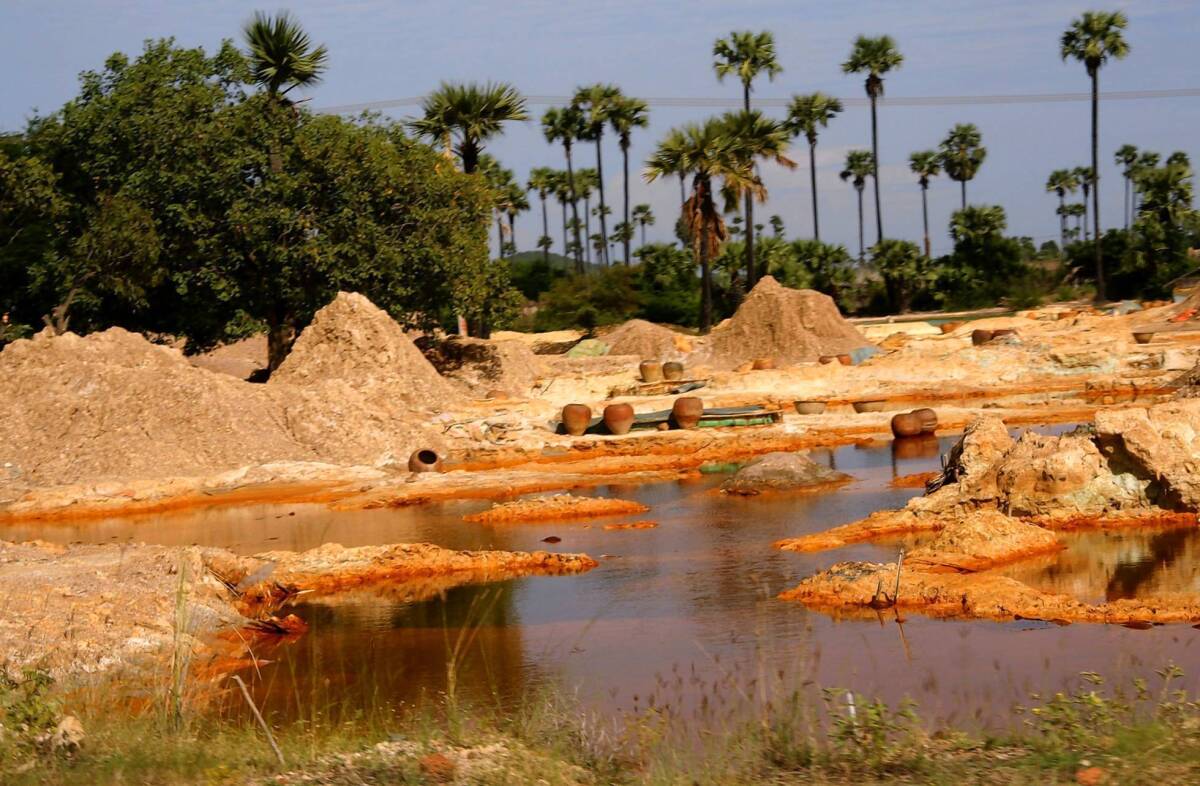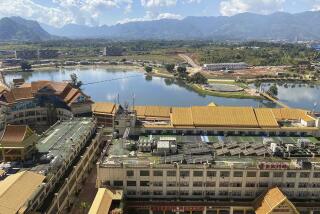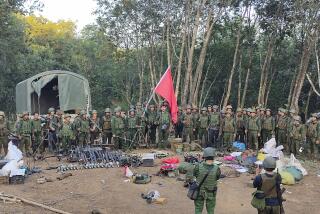Myanmar farmers protest land seizures for copper mine

LETPADAUNG TAUNG, Myanmar — For generations, Ko Myint Tin and his ancestors grew wheat, corn and onions on this fertile land in northern Myanmar. These days, he’s propagating banners and slogans to protest the seizure of his family’s farmland by powerful Burmese and Chinese military interests hungry for the copper beneath the furrows.
Ko Myint Tin, 34, said he was pushed into accepting $650 per acre in “crop damage” in 2010 that, once the documents were signed, resulted in his losing control of his 24 acres.
All told, the mining company has appropriated 7,800 acres from area farmers as part of an expansion of Letpadaung’s copper mine. So far, four of 26 communities have been forcibly removed, their schools and monasteries razed for strip mining.
For the first year or so, farmers kept quiet, conditioned to obey in a country where dissent has long been met with brutal force. But growing desperation, and the promise of nascent freedoms in Myanmar, which is also known as Burma, drove them to speak out.
late November, hundreds of farmers backed by student leaders and veterans of the so-called 88 Generation, some of whom spent years in jail for opposing the government, blocked mine access for weeks under banners carrying slogans such as “Our mountain, do not invade.”
“We are ready to give our lives to get our land back,” said Ko Myint Tin.
Local authorities reacted harshly, jailing protest leaders, destroying makeshift tents and beating demonstrators. Dozens of injured monks were reported hospitalized. The government apologized after the U.S. State Department, international civic groups and monasteries protested.
The standoff is shaping up as a test of how the new Myanmar handles land acquisition, peaceful protest and political disputes after decades of totalitarian rule, and of what limits it places on Burmese and Chinese military and political influence. The copper mine is run by the military-owned Union of Myanmar Economic Holdings and a unit of Beijing-based weapons maker China North Industries.
“It’s a worrisome indication there might be separate rules for military interests and others,” said Phil Robertson, Thailand-based deputy Asia director for Human Rights Watch. “When you talk about rule of law, it has to be applied the same everywhere.”
But villagers near the mine face tough opposition from powerful interests.
“Toward a better future,” read a company billboard by a sign warning that martial law was in effect. A few hundred yards away, past dozens of shiny Chinese dump trucks and concrete dorms for Chinese workers, pools of water in Technicolor shades dotted fields that were largely devoid of plant life.
“Fear is pervasive,” said Ko Wai Lu, an activist with the Yangon People Honorary Network, who was detained by police in Yangon for more than a week for his support of the Letpadaung protest. “Since it’s the military, even the police are afraid, let alone villagers.”
In late November, the parliament launched an independent investigation headed by Nobel laureate Aung San Suu Kyi of whether the Letpadaung expansion should proceed. Defense Minister Lt. Gen. Wai Lwin opposed the inquiry, saying the project employs “world-standard management practices.”
A few miles from the protest site, villagers in Kankone attended the funeral of San Dar Win, 26. The pregnant woman had complained of breathing problems, then died three days after her child was stillborn. Locals blame chemicals used in the mining. Buddhist sutras blared from a loudspeaker as women wailed around the body, wrapped in pink sequined cloth beside flower sprigs and cookies.
A few houses away, Ko Aung Soe, 41, sat under a rattan roof with his father, remembering the 5,500 acres seized in 1978, 1997 and 2003 from Kankone farmers for its copper.
Initially, there was little obvious damage. But tanks used to leach out the ore began to overflow, spreading chemicals on the land and in the creek, killing crops and fish. After 1993, when miners started spraying acid on the tailings under a new open-pit system, people began complaining of nausea, asthma, blisters, eye inflammation and higher rates of cancer, especially liver cancer.
Soon, butterflies and the bees needed to pollinate crops disappeared, Ko Aung Soe said. Well water acquired a metallic taste, turning yellow after sitting a few minutes. The mining company wouldn’t release findings of its testing, he said, and most residents started traveling miles to get their water.
“Half of us have breathing problems, including me,” said Ko Moe Khaing, 38, a peanut farmer with two children. “When we walk to other villages, they think we’re weak, but I think we’re poisoned.”
Area residents say they’re doubly squeezed, forced to buy food they once grew and to spend more on healthcare.
Unlike their Letpadaung neighbors, Kankone farmers who lost land years earlier seem more resigned to their fate.
“During the junta days, we had no recourse, no voice,” said U Bo Than, 62, who lost 70 acres to government seizure two decades ago. “It’s your duty to the nation, we were told.”
Most in Kankone see their best hope in the courts or parliament, not demonstrations. Their demands wouldn’t be controversial elsewhere: Compensation. Testing of water, soil and air by an independent laboratory. Trees to block acid rain. A clinic.
“Simply shouting won’t work,” said Ko Aung Soe. “It’ll just waste time and meanwhile the project goes on.”
And if the protesters’ tactics work, he added, he and his neighbors can always ride their coattails.
Addressing decades-old injustices remains a huge challenge leading up to the 2015 national election, said Ma Thida, editor of the Myanmar Independent News Journal. “We’re just seeing the iceberg, not what’s under the water,” she said. “But people’s expectations are also unrealistic.”
Most Burmese are wary of the military’s intentions, and the feeling is compounded when China, with its voracious appetite for resources, is involved. Ties between China and Myanmar grew stronger after the West first imposed sanctions on Myanmar in 1988, and many Burmese believe Beijing helped prop up the military regime for years.
China uses copper in some of its weapons systems, and the metal also has broader strategic value.
This week, Chinese Ambassador Li Junhua said compensation, relocation and other sensitive issues had been negotiated with the Myanmar government in accordance with its laws. That followed a November editorial in the Global Times, a Chinese Communist Party mouthpiece, that said halting the project would be a “lose-lose” situation and that “only third parties, including some Western forces, will be glad.”
Rumors have swirled that Chinese officials are unhappy that their Burmese military partners haven’t controlled the protesters.
“The Chinese want to squeeze more and more profit out without thinking of the people,” said farmer Ko Moe Khaing. “They just cozy up to local officials.”
Most farmers didn’t understand their rights or the legal language when they signed away their land in 2010, said activist U Aung Soe, who has held tutorials on the constitution and helped write an open protest letter. “We’re not expecting a settlement,” he said. “Part of this is about empowerment, so people know they have a voice.”
Government supporters counter that the protesters are against Chinese opportunists.
“Would they demonstrate if this were a Western company?” asked Wunna Mar Jay, a former air force pilot with the Myanmar Journalists Union. “I think farmers are faking and controlled by someone. Last year they got money, electricity, a new village. Now they’re shouting again.”
As a truck rumbled by loaded with tailings to be dumped on village land, U Bo Than thought back.
“As a boy I’d walk these mountains, graze cows, everything was green,” he said, his mouth missing teeth and stained red from betel nut. “To lose your land is like losing your soul. Nowadays, this place is like hell.”
More to Read
Start your day right
Sign up for Essential California for news, features and recommendations from the L.A. Times and beyond in your inbox six days a week.
You may occasionally receive promotional content from the Los Angeles Times.






